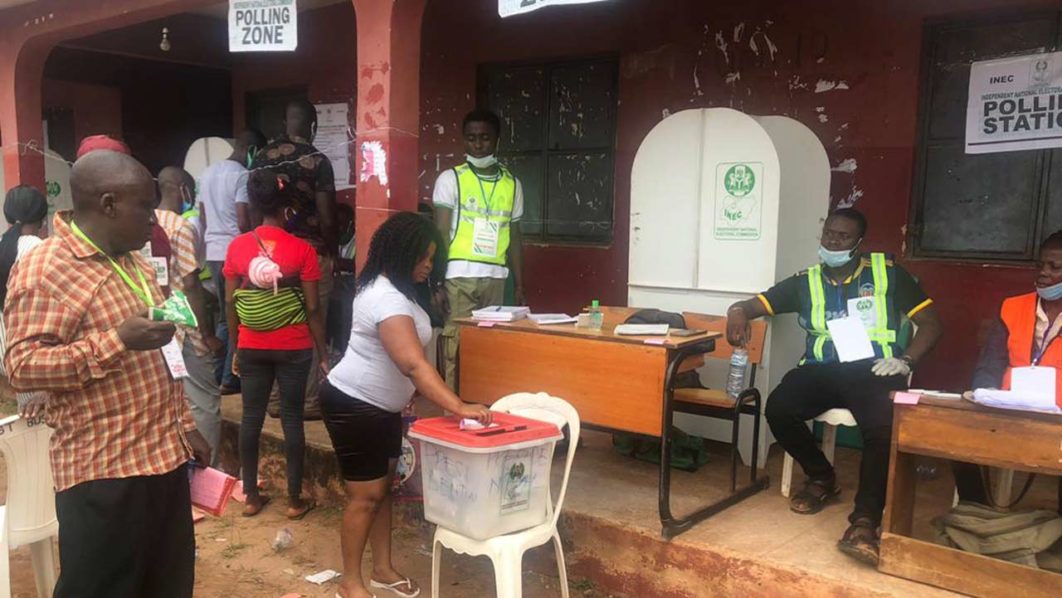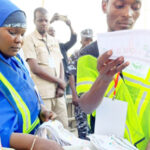Tomorrow, March 18, Nigerians that have their voter’s card will troop to their respective polling units to select from 837 candidates contesting for the governorship in 28 states and 10,240 candidates for 993 state house of assembly seats in the 36 states of the country.
On February 25, elections were held to elect a new president, vice president, and members of the National Assembly. The full post-mortem is yet out on the elections.
But tomorrow, it is expected that every Nigerian of at least 18 years of age with a Permanent Voters’ Card (PVC) will exercise this very important civic duty.
This election is vital as it will showcase how far the Independent National Electoral Commission (INEC), political parties and contestants, security agents, the Nigerian voter, and other stakeholders are ready to improve on the experiences.
Voting is vital in tomorrow’s election
Niger CP tasks DPOs on security in IDP voting centres
This is very important because of the magnitude of the candidates for the elections. There will also be supplementary elections, including the senatorial election for the Enugu-East district, which was suspended because of the death of the Labour Party candidate, Oyibo Chukwu.
The INEC Chairman, Prof. Mahmood Yakubu, told a review meeting with the Resident Electoral Commissioners (RECs) at the commission’s headquarters in Abuja, that the Bimodal Voter Accreditation System (BVAS) would be deployed for voter accreditation and result management, adding that the deployment of BVAS has gone a long way in sanitising voter accreditation in recent elections.
He explained that the commission has intensified the technology review to ensure that glitches experienced, particularly with uploading results, are rectified.
It is important that INEC surmounts all logistic challenges and ensures a seamless election through the timely conveyance of personnel and large quantities of election materials. It is hoped that the postponement of the elections, which were supposed to be held on March 8, provided an avenue for INEC to right all the wrongs in the presidential election. The experience of the February 25 elections, where materials and personnel arrived very late, in many areas, must not be repeated.
Moreover, INEC’s staff must exhibit the highest form of professionalism, especially with voters, while eschewing any appearance of compromise. In the same vein, the nation’s defence and security agencies should be on alert for the sustenance of peace and security in and around polling booths. Despite the minimal pockets of disruptions and violence across the nation in the February 25 presidential and National Assembly elections, they performed well. But they cannot rest on their oars.
All deployed personnel from the Nigerian Army, Navy and Air Force, Police, Department of State Services (DSS), Nigeria Security and Civil Defence Corps (NSCDC), Federal Road Safety Corps (FRSC) and the Federal Fire Service must adhere fully to the Code of Conduct and Rules of Engagement for Security Officials on Electoral Duty, which serves as a uniform standard of conduct guiding the behaviour of all security agents from various agencies involved in election duty.
More importantly, politicians need to be reminded that an election is not a do-or-die affair. Political hooliganism should not be part of this election in any way. Already, we have observed violence in some states in the buildup to this election. Candidates must talk to their supporters to ensure that the election is not violent in any way.
In addition, the candidates should focus on mobilising voters to the polling booths in order to stop the perennial issue of low voter turnout, as voter apathy is a disservice to democratic ideals. We must not have a repeat of the presidential poll, which witnessed a low turnout. Also, politics is local, therefore, residents of states must understand the importance of this election, as this is closer to them than the presidential, and all the dividends of democracy start from this point. It is, therefore, imperative that it is done well, and only a reasonable turnout can ensure that the man or woman whom the majority wants is elected for either the governorship position or house of assembly.
Candidates must not forget to abide by the peace accords signed with the National Peace Committee by the presidential candidates of the 18 political parties on behalf of themselves and other contestants.
Nigerians would not entertain any excuses for failure. All stakeholders should get involved, including traditional, religious and community leaders. All hands must be on deck. The relative peace enjoyed in the February 25 elections must be improved upon.
Nigerians should troop out and exercise their civic duties. They should contribute to keeping the peace by being law-abiding. They should not sell their votes. This election must not only enthrone good governance at the second tier of government, it must also send a message to the nation’s leaders that the citizens cannot be taken for granted.
Daily Trust enjoins INEC to ensure that the elections reflect the wishes of the majority of Nigerians. The development of the country rests on a credible electoral process and the election of competent Nigerians. This is the essence of tomorrow’s vote. So, every eligible citizen should stand up and be counted by trooping to their polling units and participating in the democratic process.

 Join Daily Trust WhatsApp Community For Quick Access To News and Happenings Around You.
Join Daily Trust WhatsApp Community For Quick Access To News and Happenings Around You.


